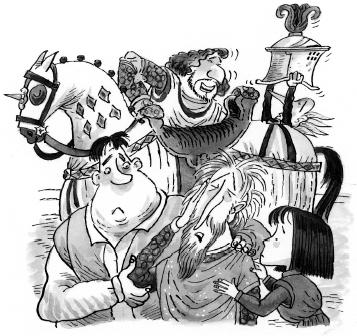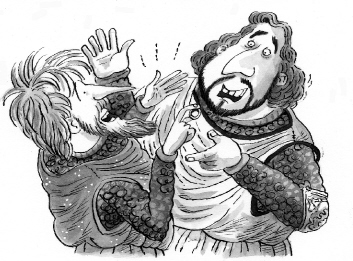The Knight of Silk and Steel (5 page)

“I don’t think so,” Ulrich whispered and gave a little gasp for air. “Just help me to my feet, my faithful squire.”
The girl and Leonard the landlord dragged him up as Charles the butler helped Lord Seckau down.
The old lord grinned a red-faced grin and walked towards the unhurt Ulrich. “You young men are all the same,” he said. “In too much haste. You need to learn that in a charge, swift deer don’t beat a standing bull.”

Ulrich smiled. “I’ll learn, good lord.” He reached into the leather purse that hung from his silken belt. “The payment for my lesson’s one gold ring,” he said, and passed the prize across.
The knights removed their iron gloves and shook each other’s hand.

Someone caught the great, grey horse and led the way back down the hill.
Meg sighed. “You’ll never win your lady fair if you don’t fight more carefully.”
Ulrich nodded. “Oh, I win as many as I lose. What matters is I play the game. I do my best and no one can do more. I’m not like all the other knights – the ones who stay at home and use their strength to beat and bully poor peasants.”

They reached the tavern. Meg helped Ulrich take off his armour and pack it safely away.
“Can I come with you, Ulrich? Be your squire?” the crop-haired girl asked quietly.
The knight faced the sun that sparkled in the gold threads of his shabby dress.
“No, Meg, the greatest knights always ride alone. Go home,” he smiled. “You’ll have your own hard battles to fight, for life is often cruel.” Then he climbed onto his horse and turned its head towards the west.
“I’ll not forget you, or the lesson that I learned,” Meg shouted after him. “I’ll do my best and no one can do more.”
The knight rode away from the tavern as the sun was setting and turned the sky to the colour of blood.

Ulrich of Liechtenstein was born in Austria in 1200. He fell in love with his master’s lady (he says) when he was just twelve years old. He then travelled around Europe as a knight errant to prove his love by fighting anyone.
He set off on a journey from Venice to Vienna, and called his travels “The Venus Tour” because Venus is the goddess of love. He dressed in a long, blond wig and a woman’s dress so he looked like Venus … Venus with a beard. That was enough to put any enemy off!
Ulrich must have been very rich because he owned three castles and was able to offer a gold ring to anyone who could defeat him. Anyone who he beat had to give a gift to his lady and bow to the four corners of the Earth.
Ulrich said he broke 307 lances and won just as many fights. But he was not that great a warrior. He had to give away 271 rings, so he lost almost as many fights as he won.
We know about him because he wrote a long story-poem about his adventures and called his poem “Service of the Lady”.
When Ulrich finished the Venus Tour, he rode to his lady’s castle. But what did she say? “Go off and do it again!” And when he had fought even more battles for her, did she fall in love with him? Sorry. No, she didn’t. She was a hard lady to please.
The odd thing about knights was they liked to fight for a married woman … a woman they could never win. Ulrich was disgusted with other knights of the time. He thought they were not true men. He wanted to show them how a real knight lived and fought … even if he had to wear a dress to prove it.
Ulrich went on to be a great lord in Austria … even with a broken heart. He died at the good old age of 78.